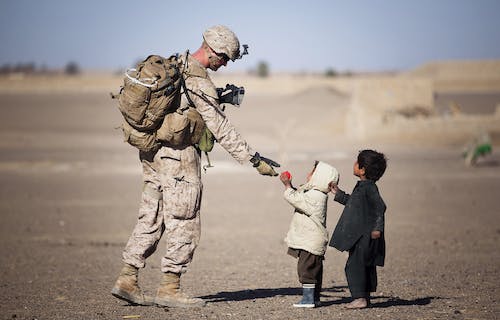Understanding The Types of Discharge in the Military

Understanding military discharge is essential for both employers and military veterans. A military discharge, simply put, is an ending of military service with the military issuing basic forms to those who have chosen or were asked to terminate service.
While the most common type of military discharge from the military is honorable, there are other lesser-known types of military discharge including administrative discharge, dishonorable discharge, and “other than honorable” (OTH) discharge.
For employers considering hiring service members, it is important to understand the difference between these military service discharges in order to get a better understanding of a veteran’s experience or qualifications for certain roles.
In particular, administrative discharges involve academic failure or medical conditions; dishonorable discharges involve cases of egregious breaches and criminal referrals from command; and “other than honorable” discharges are shortfalls that typically involve misconduct but may not warrant a dishonorable military discharge.
These are just the tip of the iceberg to help you understand the military’s separation processes. Below we will discuss the types of discharges in more detail.
Contents
Types Of Military Discharges

Honorable Discharge

Service members who have been serving their military duties with distinction may receive an honorable or general discharge. The discharge review board assesses the service member’s contributions to the service and may consider any negative or positive action during service for their determination of honorable discharge. The higher the score received by a service member, the higher the likelihood they will be awarded an honorable discharge. Those service members that are awarded an honorable discharge can expect certain rights and benefits upon their release from service.
A service member who has been given an honorable discharge from the military receives many benefits and privileges that reflect their service. These include but are not limited to:
- Access to military records
- Preferential service selection for federal government jobs
- GI Bills to pay for education,
- Loans
- Medical benefits from the VA
- Retirement money when they leave the service
Honorably discharged military members are even eligible for reenlistment in the armed forces if they choose to continue their careers in the service. Military members also benefit from programs set up by the Department of Defense such as Transition Assistance Programs, which are aimed at helping them prepare to transition back into civilian life with ease.
Reasons for receiving an honorable discharge
Service members can be given an honorable discharge for a variety of reasons. The most common reasons include:
- Exemplary performance throughout their enlistment
- Completion of all required commitments
- Participation in active combat or holding an important position within the military such as a commander/leader
- Serving honorably with exemplary character
- Properly following orders and regulations
Ultimately, such “honorable” acts in their time as service member would merit an honorable discharge and reap the benefits of the title.
General Discharge Under Honorable Conditions
A general discharge under honorable conditions is given for service that is deemed satisfactory but does not reach the highest possible performance and conduct standard. This type of discharge may be awarded when a service member has displayed some form of bad conduct or bad behavior during their military service, which can include substandard performance or repeated violations of rules.
For example, a service member may receive a general discharge under honorable conditions for instances of minor misconduct such as being late to duties or failing to meet fitness standards.
The type of discharge is generally reserved for service members who have not had any violations that are severe enough to merit punitive action and reprimands, but still, leave room for improvement in regard to their conduct and behavior.
Although the general court-martial will not give punitive discharge in this case, an entry-level separation and several benefits can still be eligible for general discharge under honorable conditions. Benefits associated with general discharges may include:
- Eligibility for VA benefits
- Health care
- Disability compensation
- Pension
- Loans
- Montgomery or Post-9/11
- GI Bill educational benefits
This discharge does not provide the same level of honors seen in an honorable discharge, but a general discharge under honorable conditions still offers important advantages for veterans looking to access veterans’ benefits and services.
Other Than Honorable (OTH) Discharge
Receiving an Other Than Honorable (OTH) Discharge is considered to be the most severe type of discharge that a service member can receive without being tried in court martial. This type of discharge implies a pattern of major deviation from the expected behavior, omissions, or conduct from a military member of the service and is usually initiated by their commanding officers.
OTH discharges are issued for instances such as bad conduct in addition to criminal or security violations. serve as a means to terminate service members who no longer meet the code of expectations established by each service branch within the United States Armed Forces.
All service branches like the air force adhere to this procedure set forth by service regulations in order to ensure that military personnel fully understand any restrictions or limitations for criminal activity and continued military service.
Will there still be any benefits?
Veterans who have been discharged from military service under an Other Than Honorable (OTH) Discharge are not automatically eligible for military benefits, as their discharge status must first be reviewed by military discharge review boards.
Nonetheless, the Veterans Administration (VA) will examine applicants on an individual basis to evaluate if they should qualify for a particular benefit or class of benefits. Upon submission of a benefits application, such as for disability compensation, the VA will conduct a “character of service (CSD)” examination which weighs the applicant’s service record against legal regulations in order to make a determination on eligibility.
Those who have been convicted of criminal activities or espionage are not eligible for this determination.
Reasons for receiving an other than honorable discharge
A military member may be warranted with OTH discharge for various reasons, such as:
- Deliberate misconduct or disregard of the Uniform Code of Military Justice (UCMJ)
- Drug use or possession
- Not following orders from a superior officer
- Desertion (leaving military service without authorization)
- Conviction by a civil court for a serious crime
- Serious violations of military regulations
- Assault and Abuse of authority
Having an OTH discharge on a veteran’s DD 214 can affect their ability to get a job and reintegrate into civilian life. It is important for veterans with an OTH discharge to seek out resources that may be able to provide assistance in appealing the decision or getting help with finding employment.
Bad Conduct Discharge
A Bad Conduct Discharge (BCD) is a form of punitive discharge that requires that the service member goes through the military court system before being formally discharged. This discharge usually has to do with inappropriate behavior, and while it is a less severe punishment than a dishonorable discharge, it still carries a lot of negative social implications and can make it very difficult for the individual to find a job in the future.
It is often the last resort when other forms of punishment such as demotions or extended periods of basic training have been found to be ineffective. It is also possible for a service member who has been punitively discharged for bad conduct to still be eligible for certain benefits.
A Bad Conduct Discharge (BCD) issued by a Special Court Martial is treated in the same manner as an Other Than Honorable Discharge and the VA will evaluate the conditions of your service to assess your eligibility.
Conversely, if you have been awarded a BCD by General Court, it is highly unlikely that you will be able to receive any benefits as this discharge removes you from all further military service. Certain behaviors such as alcohol or drug abuse and patterns of disobedience are seen as grounds for punitive discharges and can restrict any future military service.
It is clear that little to no benefits are available to anyone who has been punitively discharged. The most important thing for veterans with a Bad Conduct Discharge is to seek out resources that may be able to provide assistance in appealing the decision or getting help with finding employment. Having an open dialogue with counselors and other support organizations can be beneficial when it comes to transitioning into civilian life after a BCD has been issued.
Dishonorable Discharge

A military service member deemed to have committed a particularly egregious act of misconduct can receive a dishonorable discharge from the military. This discharge is among the harshest forms of military punishment and carries a wide range of effects and will greatly impact a veteran’s ability to receive benefits and services. It can also significantly alter a service member’s re-entry into civilian life, as the social stigma associated with this type of discharge can be difficult to overcome.
Consequences of a dishonorable discharge
A dishonorable discharge carries a hefty set of consequences, potentially holding life-long implications. Not only can this form of discharge give you difficulty in getting a job or acquiring loans for schooling, but it also removes basic civil liberties such as the right to keep and bear arms. Furthermore, one may be disqualified for employment in the federal government and known services that provide benefits from the civilian government could become inaccessible or restricted (e.g., unemployment or federal student loans). Furthermore, a dishonorable discharge will also remove any eligibility for VA benefits, as well as any military awards or decorations.
Reasons for receiving a dishonorable discharge
The following acts are considered major offenses which can result in a dishonorable discharge:
- Desertion for a long period of time or in the face of enemy combat
- Commission of a serious crime
- Fraudulent enlistment
- Use/distribution of illegal drugs while on active duty
- Conspiring to overthrow the government or commit treason.
- Conviction at court-martial for any of the above offenses
- Commission of any other activity that brings discredit upon the armed forces.
How Bad Is A Dishonorable Discharge
With the things we said above, it is pretty clear that a dishonorable discharge is one of the worst forms of military punishment. Not only can it strip veterans of their benefits, but it can also have long-lasting effects on their ability to reintegrate into civilian life. Not only will it be difficult to find a job, but the series of repercussions that come with a dishonorable discharge can be emotionally, financially, and psychologically damaging. Unfortunately, the consequences of a dishonorable discharge often follow veterans for life.
Medical Discharge

A medical discharge is a process initiated by the military in cases where a member has become unable to perform their duties as a result of an illness, accident, or disability. In the instance an injury, disease, or disability pre-existed prior to service, that individual may be able to receive a medical discharge due to the condition worsening as a direct result of their time in the military.
Military personnel are expected to undergo periodic health checks throughout their service and if any concerning changes arise that impact the individual’s ability to carry out their job, then a medical discharge is likely to ensue. The feedback from such medical exams typically does not reflect negatively on an individual’s service record. As such, when making future job applications it should not affect their chances of employment unless specified by the recruiters.
Consequences of a Medical Discharge
The consequences of a medical discharge can vary greatly depending on the specific situation and circumstances. Generally, those that receive a medical discharge will be given an honorable or general (under honorable conditions) discharge status. This means that they are still eligible for benefits such as VA disability compensation, healthcare coverage, educational opportunities, and GI Bill benefits.
Specifically for medical benefits, the military provides full-time coverage to service members who are enrolled in the TRICARE program. However, those medically discharged must switch to a civilian health insurance plan and apply for VA disability benefits in order to continue their coverage. Additionally, they may be eligible for additional compensation if their condition is classified as “service-connected” which means that it was a direct result of their time in the military.
Reasons for receiving a Medical Discharge
Below are some of the most common reasons for a receiving such discharge:
- Serious injury or illness
- Mental health issues such as Post Traumatic Stress Disorder (PTSD)
- Physical inability to carry out their duties due to an existing condition
- Failure to adhere to general health and safety standards
- Medical conditions that are exacerbated by the service.
- Developmental disabilities that are not compatible with military service.
These are just some of the reasons why a medical discharge is necessary under certain circumstances. Ultimately, it is up to the discretion of a military doctor as to whether or not an individual will receive this type of discharge.
Is Medical Discharge Honorable?
A medical discharge from the military may be honorable depending on the circumstances. In general, a servicemember who becomes medically unavailable for continued service due to injury or illness sustained in service to their nation is honored for their courage and commitment in doing so. Many veterans of such discharges receive awards and accolades for their contribution, making medical discharge appropriate recognition for rendering unique devotion to duty. Such honor ensures that servicemembers’ sacrifices are rightfully acknowledged.
Conclusion
Understanding the different types of discharges can help employers to really penetrate the psyche of a veteran and gain insight into their experiences. Each type carries its own implications in terms of eligibility for benefits, employment opportunities, citizenship status, and legal rights.
An honorable discharge is the highest commendation that can be awarded to a service member so that their sacrifice is recognized. Dishonorable discharge is the worst type of discharge and can have serious consequences for the individual, even treating it as a federal crime. The discharges in between does not go unnoticed and should not be taken lightly. It is important for employers to understand the significance of each type of discharge and evaluate it on a case-by-case basis. The benefits and privileges of each type of discharge must be taken into account in order to make a fair and informed decision.
Finally, it is of utmost importance that a service members take pride in their service and strive to maintain honorable standards throughout their tenure. Making a conscious effort to live up to the code of military conduct is the key to ensuring a positive and successful career even after their service is over. It is only through respect for the honorable traditions of the military that veterans can gain recognition and appreciation in civilian life.
FAQs
Is Other Than Honorable Discharge Bad?
An Other Than Honorable (OTH) discharge is a testament to not meeting specific standards or regulations during a service member’s tenure. Although it does not carry the same stigma as dishonorable discharge, it has its own consequences.
OTH discharge will remain on a service member’s record and limit his/her eligibility for federal benefits, and future employment opportunities, and may even constitute loss of U.S Citizenship. It is mainly because of these reasons that an OTH discharge can be considered bad or undesirable.
Is A General Discharge Bad?
A General Discharge is not always viewed as entirely bad. Generally, a service member that has served honorably yet has committed some minor misconduct may receive this type of discharge. Although there are certain benefits available to those with a General Discharge, future employment opportunities may be limited in comparison to those who have received higher ratings. Nevertheless, it can still be considered generally honorable and thus less disqualifying than other types of discharges.
Will An Uncharacterized Discharge Hurt Me?
An Uncharacterized Discharge is not necessarily bad but it can affect a service member’s future employment opportunities. An Uncharacterized Discharge does not utilize the standard categories of honorable, general, or other than honorable and thus may be viewed as vague on an individual’s record.
Employers may be less likely to hire someone with an Uncharacterized Discharge as it does not provide detailed information about the circumstances of a service member’s separation from the military. Therefore, an Uncharacterized Discharge can potentially limit a former service member’s chances for employment.
Is A Bad Conduct Discharge A Felony?
A bad conduct discharge from the military is often considered to be a felony in many states. This means that the individual has not just been dishonorably discharged, but instead convicted of a crime, effectively rendering them legally guilty of an offense similar to the civilian judicial system.
As a result, the person afflicted with this type of discharge is at risk of losing many of their constitutional rights and privileges, including voting and carrying firearms. Where legal statutes exist on the matter, they generally state servicemembers are subject to criminal charges if they are dishonorably discharged with intent or malice aforethought of any kind.







